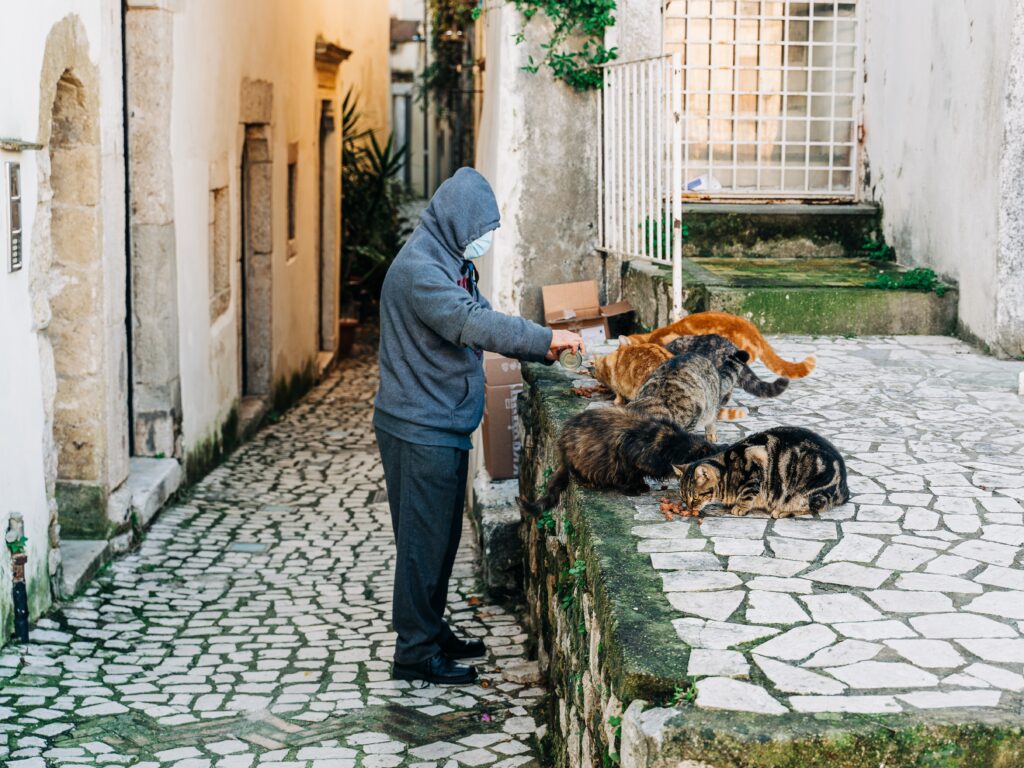UMW cautions students and staff not to feed stray animals after rabid cat bites a Fredericksburg resident
4 min read
After a Fredericksburg resident was bit by a rabid cat, UMW has warned students and staff not to feed feral cats. | Gabriella Clare Marino, Unsplash
by GARETH MANCINI
Staff Writer
Recently, there have been reports of rabies-infected cats in Fredericksburg, some of which are fed on the UMW campus by students and staff. According to a recent press release on March 31, a stray cat bit a Fredericksburg resident. On April 2, health officials confirmed that the stray cat tested positive for rabies. The cat is thought to be a part of a colony of cats that reside here in Fredericksburg, and there is a possibility that other cats of the colony are infected as well. The resident immediately received rabies preventative treatment.
Anna Billingsley, associate vice president of University Relations, notified the UMW community of these rabies-infected cats on April 6 by sending out an email from the Office of Emergency Management and Safety. The email cautioned people not to feed the cats.
“There is recent evidence that feral cats are being fed on the UMW campus,” the email said. “This practice poses a real risk to the health and safety of students, faculty, staff and visitors to campus. Please help ensure the safety of our campus by not leaving food for cats, raccoons and other wildlife that inhabit our campus. The University [Facilities] staff is authorized to remove any animal food and/or containers found on campus grounds.”
Ahead of the recent events, freshman Mackenzie Brooks had been feeding cats on her front porch since a litter of kittens was born in her neighbor’s shed in July. The kittens had wandered up to her front porch shortly after they were born looking malnourished. Although she was unable to keep them, she could not turn her back on them.
“The mom never came back for them, and they looked very skinny so I felt bad.” She had been refilling the bowl on her front porch whenever it ran out.
However, Brooks said that she stopped feeding them about two weeks ago “because of the recent incident.” She was worried that “if a cat with rabies eats out of the bowl it may be able to spread rabies to other cats that eat out of that bowl.”
Before she knew about the rabid cat, Brooks was unconcerned with the odds of rabies spreading by feeding the cats.
“Most of the cats around here are just left behind, so I felt like the chances of [rabies] spreading from the bowl of food I left wasn’t high.”
Colleen Cragun, a senior psychology major, has a similar attitude towards cats.
“I’ve seen a few stray cats in the area, if I notice any of them hanging around for a few days I try to feed them something because I feel bad,” said Cragun. “Some of them are friendly but usually they like to keep their distance.”
Sally Burkley, a junior political science major, saw three cats last week in the faculty parking lot outside Monroe.
“I was on my way to Vocelli’s after work and I walked outside and there were these three cats just staring at me,” said Burkley. She said that they didn’t bother her, but she had been seeing more cats on campus recently.
In order to help prevent the spread of rabies, health officials are encouraging residents to avoid contact with wild and unfamiliar animals. Additionally, they ask that residents report animals acting unusually and maintain current vaccinations on all domesticated cats, dogs and ferrets.
According to the Humane Society of the United States, rabies typically causes animals to act in two ways: aggressive or tame. If the animal presents aggressively, it will be drooling excessively and appear agitated. If the animal is tamer, it will allow humans to get closer than normal or even walk towards them. Additionally, if an animal that is typically nocturnal, such as a raccoon or an opossum, is spotted during the day, that may also be a sign of rabies.
The disease can be spread through saliva entering an open wound or mucus membrane, typically through a bite and sometimes even a scratch. Rabies is a disease that attacks the central nervous system. If bitten or scratched by wildlife or an unfamiliar animal, the CDC recommends cleaning the wound with soap and water and speaking with a local health care official or medical professional to determine one’s risk of contracting rabies. Rabies is easily treatable, and deaths are rare in the United States. However, rabies can be fatal if left untreated.
Since the biting incident, UMW Emergency Management and Safety has recommended that students and staff do not feed any stray cats or other animals found on campus.


